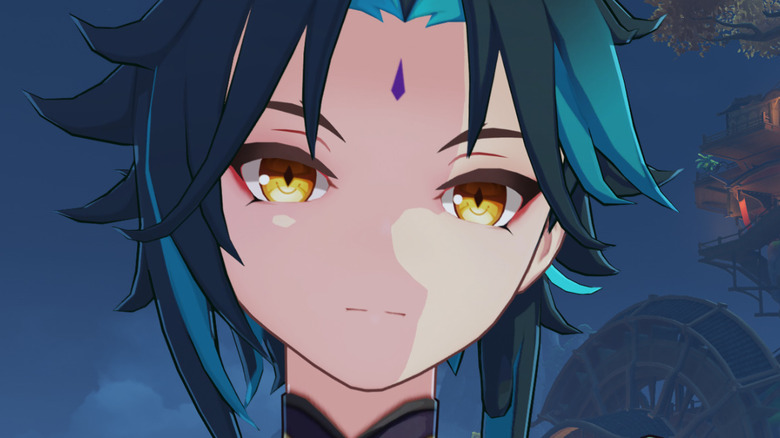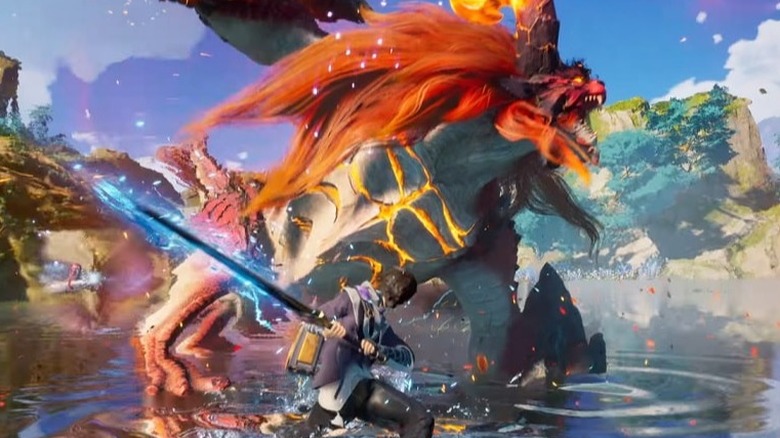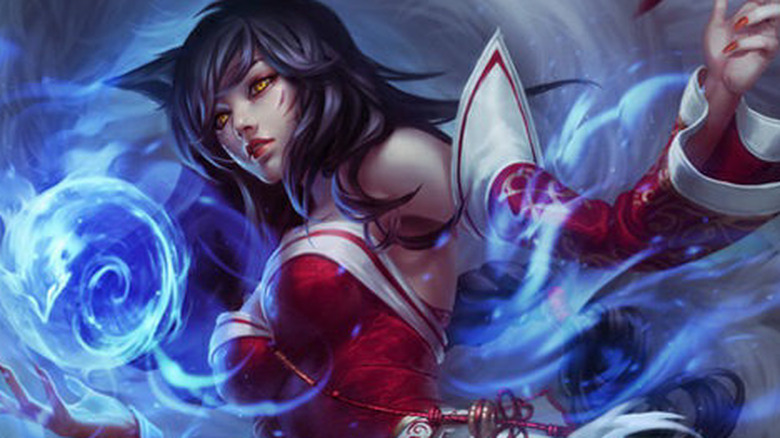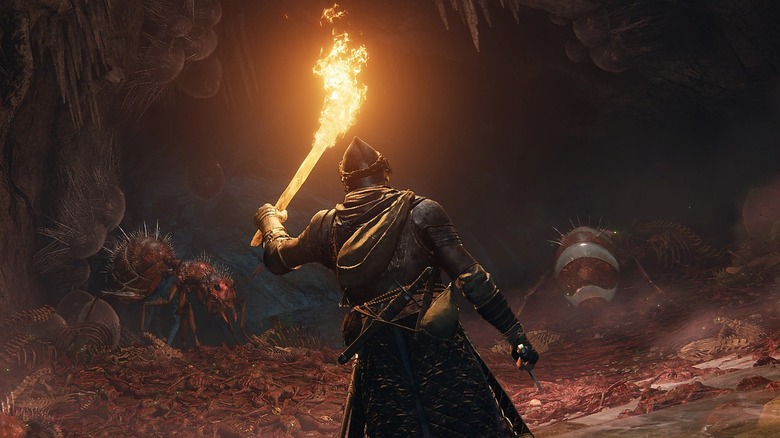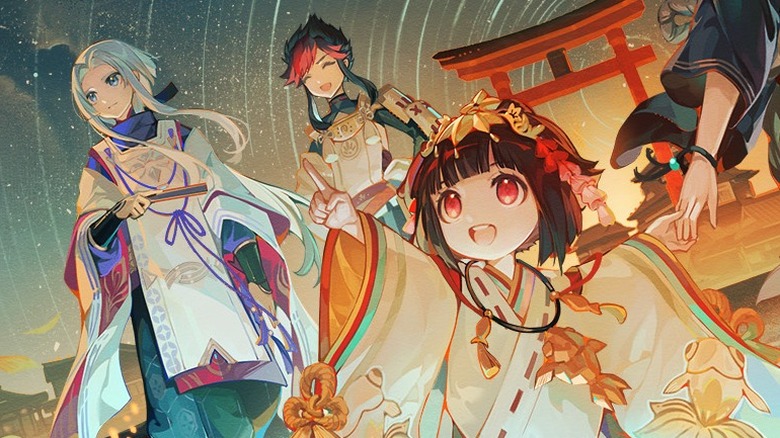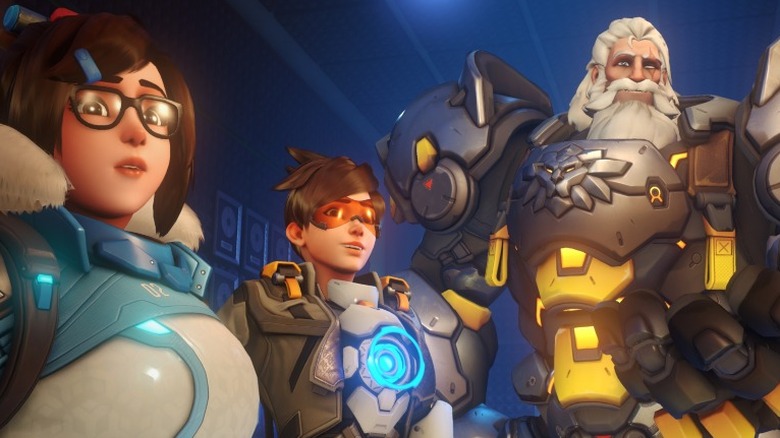Gaming In China Looks Way Different Than The US
Language, customs, and cuisine often come to mind when comparing cultures overseas. However, as westerners are learning, the gaming industry can also differ depending on the country. China has popped up in the news for its heavy-handed gaming regulations more than once in recent years, leading to a bit of secondhand culture shock from foreigners.
Some may believe China hates gaming, but it's not that simple. It endorses it as one of its biggest industries yet limits consumption at a stricter rate compared to "freer" countries like the United States. Some games that western audiences take for granted aren't even available to Chinese gamers, thanks to a series of differing regulations. These differences, big and small, shape China's gaming landscape and give it a uniqueness that other countries can't replicate.
China's gaming culture naturally affects what games are most popular and the way its citizens consume games — as well as what level of criticism is allowed regarding these policies. Here are just a few ways that gaming in China differs from the US.
Minors can only play a few hours every week
Minors, meaning anyone under 18 years old, can only play one hour a day on Friday, Saturday, Sunday, and public holidays. In other words, minors get a gaming maximum of three hours on a non-holiday week. This ruling comes from the National Press and Publication Administration (NPPA), which had previously restricted kids to 90 minutes per weekday and three hours on weekends and holidays.
As explained by research firm Niko Partners explains, "While China's government has been positive on video games recently and has promoted segments such as esports and cloud gaming as key growth areas, gaming addiction among minors is viewed as a negative output of the popularity of video games in society." The new regulations are being created to attempt to combat gaming addiction among the youth.
Minors can technically circle around these rules with the help of adults, like using adult accounts to play games, so the government asks for their cooperation in enforcing the new regulations. However, some have already found ways to get around China's new gaming laws, including renting accounts. In a post on the "Genshin Impact" subreddit, one commenter pointed out how Chinese regulations are still more difficult to work around than in the US, thanks to practices like linking to Chinese national IDs to gaming accounts.
Minors have a video game curfew
Not only do minors have a limit on the amount of time they can play games, but also on when they can play them. According to CNBC, young gamers can only play between 8 and 9 P.M. local time. Now, they can only play during the aforementioned hours on weekends and holidays, as detailed in the latest law. The NPPA previously enacted a "cybercurfew" that lasted between 10 P.M. to 8 A.M., meaning minors shouldn't be able to log into their gaming accounts outside of approved times.
Chinese gaming companies are expected to help enforce the new policy. Tencent, publisher of popular mobile games such as "Honor of Kings," even started scanning kids' faces to support the cybercurfew before the most recent law was passed. The Midnight Patrol, the developer's nickname for its initiative for enforcing bans on late night gaming, can apparently recognize faces and disable accounts if minors are caught logging into "Honor of Kings" during curfew. It also apparently imposes a prompt in Tencent games to ensure minors aren't sneaking onto their parents' phones.
Minors have a spending limit to combat overspending issues
Adding to the list of rules for minors, they can also only spend a certain amount of money. According to BBC, gamers between 8 to 16 years old have a limit of 200 yuan to spend each month, which is roughly equivalent to $29 USD. Older teens between 16 and 18 years old can spend double the amount at 400 yuan.
Playtime restrictions can help curb video game addiction in terms of time spent on the game, but not necessarily how much one spends on a game. Fortune reports that Chinese developers spent much of the 2000s creating highly addictive games meant to earn companies money. As a result, overspending on games is a now a problem plaguing gamers throughout the country. Tencent's Midnight Patrol even tracks those with high spending habits — partly because of how many of these "overspenders" tend to be minors.
Players have to use their real names and identification numbers
As noted previously, minors in particular face many restrictions designed to limit how much they can play and determine when gaming is allowed. With this in mind, the authorities have methods in place to track exactly who is playing a game in order to know whether they are a child.
One way that this is done is with a verification system. As reported by the South China Morning Post in 2020, this specific policy forces companies such as Tencent and NetEase to introduce a pop-up menu when games are launched. This window then requires players to enter both their real name and a personal ID number. These numbers are unique to each individual and allow the companies and the government to track exactly who is playing games and at what times.
Using the information provided, Yodo Games told Pocket Gamer that appropriate restrictions are then put in place, depending on the age of the player. Of course, even these stringent rules don't always prevent minors from using their parents' information to bypass limits.
Console gaming just isn't as popular
China's now-defunct console ban remains still affects its gaming landscape today, even though it was abolished years ago. Fearing the negative effects of gaming, like video game addiction, China prevented retailers from selling consoles like PlayStations and Xboxes in the country. Josh Ye, tech and gaming reporter for the South China Morning Post, explained in a look back at the ban that the current emphasis on PC and mobile gaming is just one of the consequences.
China lifted the ban in 2015, meaning it didn't have any consoles sold in the country from 2000 to mid-2015. That means "Pokemon," "Persona," and many other AAA console titles that westerners know as part of the mainstream were never released in China during that time. Not legally, at least (as noted by Kotaku).
However, even if console gaming isn't as popular, it's growing. For example, PlayStation's recent stats suggested that its Chinese consumer base will likely grow much larger in the future — so long as Sony continues investing in PC and mobile titles.
Most Chinese games are free-to-play
A combination of factors, like the 15-year console ban and the smartphone boom in the early 2000s, created a culture that adores free-to-play games in China. In fact, Mintegral polled over 1,000 Chinese gamers and found that over 60% of them preferred free-to-play titles over premium ones.
Niko Partners' Daniel Ahmad told Kotaku's Sisi Jiang that around 92 to 95 percent of the games made in China use a free-to-play model. As noted by Kotaku, when it comes to gaming, Chinese consumers tend to think of PC and mobile games ahead of the types of AAA console games that are prevalent in the West. Some of China's most popular titles include "Honor of Kings," "Genshin Impact," and "League of Legends."
However, the emphasis on free-to-play games can have consequences of its own. Many of these games support addictive habits through loot boxes or the gacha mechanics seen in titles like "Genshin Impact" (via Inverse), which spur the kind of culture that China seems to be trying to correct with its strict gaming laws.
China has the esports industry in the world
VentureBeat reported China as the top esports market in 2020, and it looks like it'll be the same for 2021 and beyond. China's esports audience was made up of approximately 162.6 million people in 2020, making it nearly three times the size of North America's audience. According to Newzoo's 2021 Global Esports & Live Streaming Market Report, those numbers will only grow larger across the board, meaning more esports competitors and watchers will be joining the fun.
However, Niko Partners raises the question of how gaming for only three hours per week will affect esports training for competitions in China. Esports are becoming more and more like Olympic sports, with recruits often starting their training at a young age. On the other hand, China also highlighted esports and cloud gaming as two growth areas in the past year without seeming concerned about any negative effects, which illustrates the fact that the country sometimes shows gaming-friendly behavior, even as it remains dedicated to curbing video game addiction.
No dead bodies, gambling, or knocks at Chinese history allowed
China banned the approval of any new games containing dead bodies and blood of any color, games that feature gambling, and games that negatively portray the country's history. The State Administration of Press and Publications created this approval process for digital games and introduced these changes in 2019.
Niko Partners clarified that dead bodies aren't completely outlawed, but they must "disappear quickly (fade away or otherwise)" and pools of blood of any color aren't allowed to be shown on screen. And yes, "blood of any color" means no pink blood like in "Danganronpa" or green "slime" blood, either. Sometimes developers use these colors to escape loopholes for violence and ratings.
Games also now require any "loot box systems or lucky draw systems" to list the probability of receiving valuable items. According to regulations, this probability should be listed as a percentage, along with the number of times needed to draw on either the game website or in-game. For example, "Genshin Impact" states the percentage and number of pulls players need before the "pity" system activates and they're granted coveted 5-star characters. Gizmodo added that this approval process also targeted classic gambling games like mahjong and poker.
These rules only apply to games submitted for approval after August 2018, though, meaning that a few games with "racier" content have made it to stores in China.
Government-backed regulatory gaming organizations exist
The Chinese government doesn't directly decide rules for games, but certain government-backed organizations do. For example, the National Press and Publication Administration (NPPA) spearheaded the latest crackdown on minors with the implementation of the three-hours-per-week rule.
Kotaku's Sisi Jiang compares the NPPA to how one from the United States would think of the FDA when compared to the actual executive body of the government. In this sense, the NPPA is an organization in charge of regulating a specific industry within the country, as well as how consumers can engage with it.
As noted by Harris Bricken, the NPPA is "China's primary regulator of its online game industry." However, it is not alone in its task. Other government agencies also regulate the gaming industry or enforce the NPAA's rules to varying degrees. Some of these include the Cyberspace Administration of China (CAC), the Ministry of Industry and Information Technology (MIIT), and even the police force.
Nothing even vaguely harmful to Chinese government allowed
Many games have been banned in China for even hinting at any fault with the government. This includes games that joke about past presidents, games that feature Chinese soldiers as enemies, and any titles that appear to encourage or allow for anti-nationalist behavior.
For example, Chinese retailers and digital stores banned "Animal Crossing: New Horizons" after an activist used it as a platform to fight for Hong Kong's freedom from mainland China. He and the other activists held a virtual protest and posted screenshots of their "Animal Crossing" characters shouting "Free Hong Kong" with protest banners spread across the in-game island.
In the case of "New Horizons," the issue sprang from the players' direct critique of the government. However, other games like "Plague Inc.," a pandemic-simulating game, were mysteriously banned, as well. Some onlookers have theorized that there were political motivations behind that particular ban — perhaps related to the then-emerging COVID-19 pandemic — but the truth is still unclear.
Streaming of unauthorized games is banned
It isn't just the act of playing certain games that is restricted in China. Those watching streams also have their choices limited, with unauthorized games being banned completely. In 2022, the National Radio and Television Administration outlined a new crackdown on video games that would effectively prevent any streaming platforms from allowing censored games to appear. While this rule was already more or less in place, it will now apparently be fully applied.
According to Reuters, a post on the government agency's site confirmed that it would be strictly enforcing rules going forward. This is something that it hadn't really done in the past, allowing fans to watch streams of playthroughs for titles that are technically banned in the country. Popular destinations have included the likes of Tencent's Huya Live service and DouYu, which has more monthly users than Twitch. However, these sites have now been told to stop streaming foreign games and tournaments that feature unapproved titles.
Despite the apparent crackdown, streaming games in China has become a popular way for players to experience games that they might not be able to get their hands on. Daniel Ahmad, a senior analyst at Niko Partners, revealed that "Elden Ring" had been streamed by more than 17 million people following its release, despite the fact that it has not been approved by the Chinese authorities.
Players are encouraged to report games that don't follow rules
Even with all of the restrictions in place for the gaming industry, the market for video games in China remains huge. Venture Beat reported in 2022 that there are 706 million players in the country and that this number was set to grow in the next five years. While many Western releases are banned, the country still sees a steady supply of new domestic games, including many mobile titles. Policing all of them would be difficult even for the biggest government agencies, but authorities are launching a new way to help them monitor whether developers and publishers are following the country's rules correctly.
According to the South China Morning Post, a new government website was tested in 2021 by the National Press and Publication Administration, which allowed players to report games that did not implement China's policies correctly. Respondents could fill out options regarding whether a game has the proper systems in place to verify player's ages, restrict their spending, and limit how long they can play.
Fan sites and merchandise are strictly controlled
It is not just video games themselves that face censorship in China. The country's ruling party has also recently started a major crackdown of the entire entertainment industry. A 2021 report from Wired suggested that this included more restrictions on everything from fan clubs to merchandise. Sites that are focused on entertainment figures or properties, such as celebrity fan pages, now face more scrutiny than ever before.
According to the Financial Times, this could eventually lead to bans for some of the most popular video game fan clubs, which boast millions of followers on the internet. Ultimately, authorities will most likely limit how much merchandise can be sold and how often official accounts can interact with fans. What this means for gamers is that they may not be able to communicate as effectively with other players online in forums in the future, and they may even struggle to support developers by being unable to get hold of genuine merchandise.
The move may be an effort to curb the ability of Chinese residents to organize and communicate online. It remains to be seen how further restrictions may negatively impact the growth of fandoms in China.




